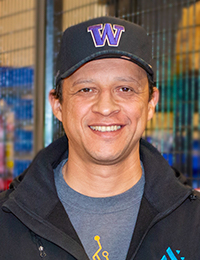Driving Results: From the Classroom to the Bottom Line
 Edwin Quezada
Edwin Quezada
Warehouse and Procurement Manager, Artisan Electric
While still a student in the UW Master of Supply Chain Transportation & Logistics degree program, Edwin Quezada was hired as warehouse and procurement manager for Artisan Electric, a solar and electrical contractor in Seattle.
From his first day on the job, Edwin found that the tools and concepts he had learned in the program could be directly and immediately applied to his job, with powerful results.
“In just a few short months, I was able to redesign the layout of the warehouse, cut inventory in almost half, streamline the flow of parts, and significantly improve the flow of critical data to our executives -- all during a period of rapid growth and expansion,” said the 2018 graduate. ”It’s been incredibly rewarding.”
From the Classroom to the Workplace
When Edwin started at Artisan, one of the first things he did was to introduce software to track on the company’s inventory — based on what he had learned in Logistics & Analysis and IT Systems & Supply Chain Integration courses.
“I knew from my coursework that I needed data on which to base decisions, so my first step was to ensure I had access to data — lots of data,” Edwin said.
Drawing on knowledge from two other courses — Facility Design & Operations Management and Inventory Management — Edwin also redesigned the company’s warehouse to improve the overall flow of materials and examined data to look for ways to streamline its inventory.
After a few months, he had cut inventory by nearly half. “Even I was surprised,” Edwin said, “When you have the data, it’s amazing how quickly you can spot opportunities for improvement.”
Building Effective Partnerships and Improving Cash Flow
From his work in the Collaboration Across the Supply Chain course, Edwin knew that developing more effective partnerships throughout the supply chain can pay powerful dividends.
“Many times, companies view their supply chains as a series of win-lose relationships, which can be incredibly unproductive,” he said.
Given the limited warehouse space at Artisan, he partnered with two of his largest suppliers to pick up parts at their facilities when the company needed them.
“They get a stable customer and I get a stable supply of parts without burdening my warehouse. It really is a win-win.” Edwin said.
This initiative also had positive impact on the company’s cash flow. Rather than tying up cash in slow-moving inventory, Edwin was able to free it up to be used for more productive uses – a concept he learned in the Finance & Performance Management course.
“Edwin was able to cut stale inventories of well over 60 days into just-in-time deliveries of two days before the parts were needed, “ said Liam Morgan, the COO of Artisan. “He cut our inventory carrying costs almost to zero. This single change has made significant improvements to cash flow.”
Investing In His Career
Although Edwin has had a number of quick successes at Artisan, he hasn’t been in the supply chain field for long. When he moved to the United States from Guatemala in 2015, he had an undergraduate degree in industrial engineering and ambitious career goals, but struggled to find an opportunity in his chosen field.
After reviewing several options, he was confident that the furthering his education with the Master of Supply Chain Transportation & Logistics would be the perfect choice for the next phase of his career.
“I had an excellent undergraduate education. I had worked in many different countries. But like most people, I wanted to be at a higher level,” he said. “So I decided to make the investment.”
Learning From Anywhere
Going back to school wasn’t an easy decision. Edwin had a family and a full-time job. How would a master’s degree program fit into the mix?
Completing a degree online, with two hours a week of real-time online instruction, made it possible.
“It was very helpful that it was an online program — I didn’t have to drive all the way to the university to take classes,” he said. “I took classes from home, from my job, or sometimes even when I traveled abroad.”
Professional Faculty and Career Support
Edwin also emphasized the value of being taught by instructors who have firsthand knowledge of the industry.
“They work in the field — they’re completely involved in what’s going on right now in the world of supply chain transportation and logistics,” he said. “So not only do they have the knowledge, they also have the experience.”
The faculty also made a difference when it came to career advice and networking.
“I’ve received plenty of support from the professors and staff regarding my career, including advice regarding interviews and help with my resume,” he said. “They also provided me with mentors — C-level executives from big companies in the area — people I never imagined I was going to know. I’m so thankful for that support.”
Always a Husky
Edwin is back on the campus these days in a different role. Artisan Electric is installing 285 solar panels on the roof of the Life Science Building. Edwin's role includes planning the logistics.
"One way or another, I'll always be attached to the UW, and I'm proud of that," Edwin said.
Updated April 30, 2020: Edwin recently accepted a new role as area manager at Amazon.